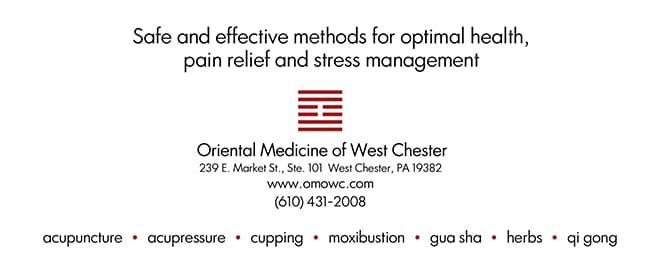Oriental Medicine & Women’s Health
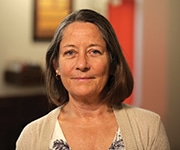
By Margaret Sheehan,
Licensed Oriental Medicine
Oriental Medicine (OM) is an umbrella term that encompasses techniques of healing that have evolved in Asian countries. Acupuncture, herbs, exercise, diet, meditation, cupping, gua sha and other techniques are used in slightly different ways all over the world.
In Pennsylvania there are Licensed Acupuncture practitioners (L.Ac.) and Licensed Oriental Medicine Practitioners (L.O.M.). The OM license requires more extensive training and includes the use of herbal medicine. Both require passing National Board Certification exams by the National Certification Commission for Acupuncture and Oriental Medicine.
OM and Women’s Health
Women have been excluded from much of western pharmaceutical and medical research. Western medicine is based on reductionist research and women are hard to quantify. We know that women suffer more than men from autoimmune conditions, fibromyalgia, anxiety, depression and arthritis.
OM offers a different perspective on why we suffer more from these conditions. OM has recognized women’s unique needs for several thousand years. OM appreciates the cycles of life and how they affect our health, and how to support our health in each phase.
Acupuncture
Acupuncture is probably the most familiar method of treatment from the OM toolkit. When practiced by a well-trained specialist, acupuncture is safe, effective and can be very relaxing. Acupuncture is used by our military on the battlefield to reduce pain and in the treatment of various problems, like PTSD, for veterans. It is used in prestigious cancer treatment centers to help alleviate the side effects of cancer treatment. Many drug and alcohol rehabilitation centers utilize acupuncture for detox and recovery. It is used to treat emotional and physical trauma, asthma, allergies, autoimmune disease, infertility, menopausal symptoms and much more.
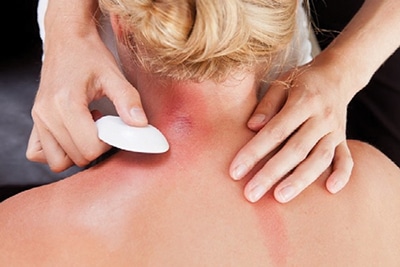
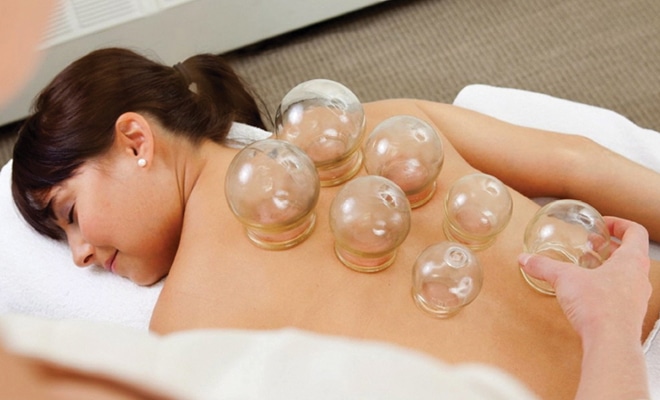
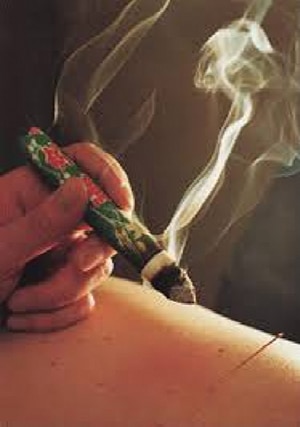
Other tools: Moxibustion, Cupping and Gua Sha
Moxa is an herbal preparation that is burned near acupoints to stimulate movement of blood. It can help turn a breech fetus, initiate labor, alleviate menstrual cramps, treat gastrointestinal problems and reduce pain from a variety of causes.
Cupping helps to stimulate blood flow superficially and can activate organ systems more deeply. We often use cupping in our clinic to alleviate shortness of breath from asthma, bronchitis, and phlegmy coughs and chest colds. It can also help athletes train and recover from injury.
Gua Sha alleviates pain by moving blood. This can affect physical and emotional pain. It also helps our immune system to release anti-inflammatory and pain relieving neuro-transmitters.
Herbal Medicine
OM uses food grade herbs for health maintenance and stronger therapeutic grade herbs for premenstrual syndrome, acute and chronic infection, infertility and menopausal symptoms.
Herbal medicine comes in the form of raw herbs you cook, granular concentrates you dissolve, capsule or pill forms. In our clinic, we only use herbs that have been tested for purity and potency, beyond US standards.
Tai Chi and Qi Gong
Tai Chi and Qi Gong are therapeutic exercise methods. Tai Chi and Qi Gong help us to align our structure and replenish and circulate our bioelectricity. When our structure is aligned our balance is better so we run less risk of injury due to falls. When we align our structure correctly, we bear our weight correctly and so our bones are strengthened in the right places. These gentle exercises can add years to our lives and life to our years. For more information call 610-431-2008 or visit www.omowc.com
Testimonials
“I learned about many alternative health practices when I had Lyme disease 15 years ago, Acupuncture is one I continue regularly to this day, now for general health and to keep my immune system strong.” ~ Carolyn C., PA State Representative and former West Chester Mayor
“I couldn’t tolerate the side effects of standard medications prescribed to treat lupus, and acupuncture helps me to keep it in remission. It relieves my exhaustion and lesions anytime I have a flare-up.” ~ Veronica C., West Chester

